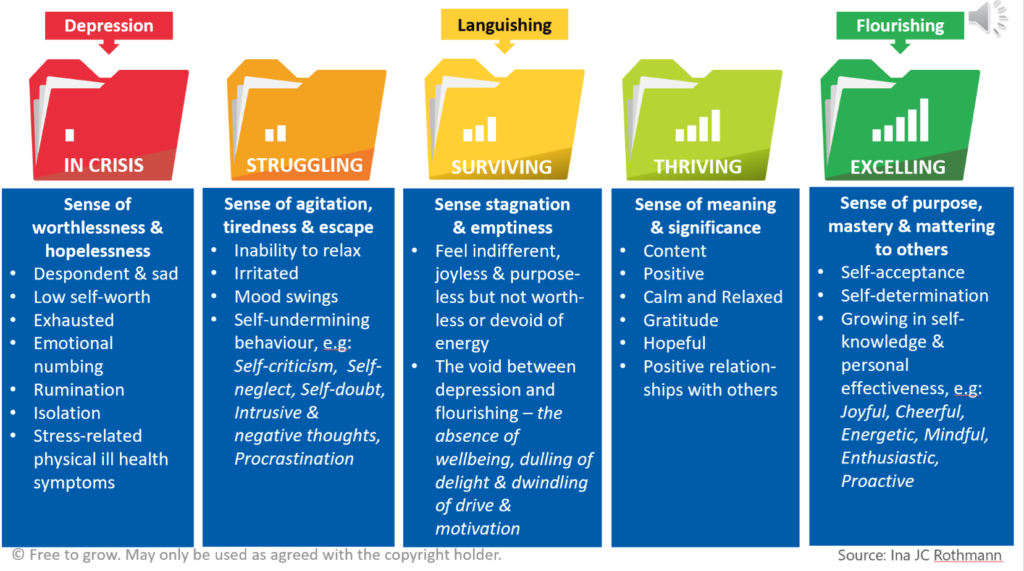“Just because no-one else can heal or do your inner work for you does not mean you can, should, or need to do it alone” (Lisa Olivera)
Managers should spot signs of depreciating employee mental health and follow up with mental health conversations. Declining mental health impacts focus and energy negatively – and ultimately productivity suffers. Spotting these signs of decline, however, are not easy as some members of the team may be laughing and seemingly happy, but anxiety and depression may be lurking beneath the façade. Regular check-ins by managers at least provide some opportunities for employees to open up about their wellbeing, but many will be hesitant to share their feelings within a large group.
The Adecco Group, a Swiss/French company based in Zurich and the second-largest human resources provider in the world, notes: “53% of managers say that they have not found it easy to identify when staff may be struggling with mental wellbeing.” Professor Ina J C Rothmann, Workwell Research Unit at North-West University in South Africa, suggests five stages of mental health, as depicted in the following table developed by Free To Grow:

The human being doesn’t remain in a particular mental state and, depending on circumstances, relationship quality, support, etc., can move up or down the spectrum. The point here is that the human being can be influenced towards achieving a better mental health status. This provides an opportunity for managers to become involved in caring conversations with and support of team members.
Alinda Nortje, Founder and Executive Chairperson of Free To Grow, helpfully notes four components of effective wellbeing conversations, viz.:
- Start with transparency – if managers really want to know how employees are doing, they need to be candid that employee wellbeing is the reason for the conversation. Exhausted platitudes and canned greetings will not convince someone to share. Managers should acknowledge the difficulty of life for everyone, remembering that many people are reluctant to reveal burnout or mental health issues out of a concern that it will limit their career opportunities. This requires managers to establish a safe, non-judgmental environment through total transparency.
- Explain that these conversations are part of the new-normal – managers should let employees know that these conversations are about their mental and physical wellbeing. Managers should ensure they know it’s the first in a series of check-ins with all employees, not just them. Instead of broad, cursory questions, managers should ask for specifics – ask them to describe specific concerns, both at home and work, that are affecting their productivity or engagement. Seek to understand clearly what fuels or diminishes their engagement.
- Focus on listening – good managers often employ the best practices of leadership coaching, particularly an emphasis on listening rather than just preaching to an employee. This is a critical element that can make or break the trust necessary to have a meaningful wellness conversation. If a leader talks too much about themselves or drags the conversation away from the concerns of the individual employee, most will just give up on sharing any important details. Show them that you hear them by listening and paraphrasing back key concerns that they are raising. You can also use a metaphor to help the employee connect with their wellbeing state. Consider a battery with indicators at full, half, and low charge – ask them where they would plot themselves given their current situation. When are they at their fullest charge? Which activities deplete their mental and physical wellbeing the most? What can you do as their leader to help them re-charge?
- Dedicate yourself to finding co-solutions to any problems that may come up – opening up the conversation and listening are good, but most people want to know that their manager can help find solutions to work-related problems. If you do get someone to open up about their mental and physical wellbeing, you need to be prepared to take action to help them do better. Familiarise yourself with the resources available through your company. If you don’t have an immediate solution, let them know that you’ll come back to them after you’ve had a chance to investigate.
Managers should stimulate mental health and employee wellbeing intentionally. Where an employee is in crisis, managers can refer the employee to a mental health professional. Mental health issues should not be career-limiting – they are challenges that so many are facing currently.
Free To Grow assists companies with boosting mental health through meaningful programmes that provide tools to encourage growth. Staying Strong, one such programme, offers profound value and serves as a platform to encourage employee wellbeing. For more information, contact me on jonathan@ftgsa.co.za










